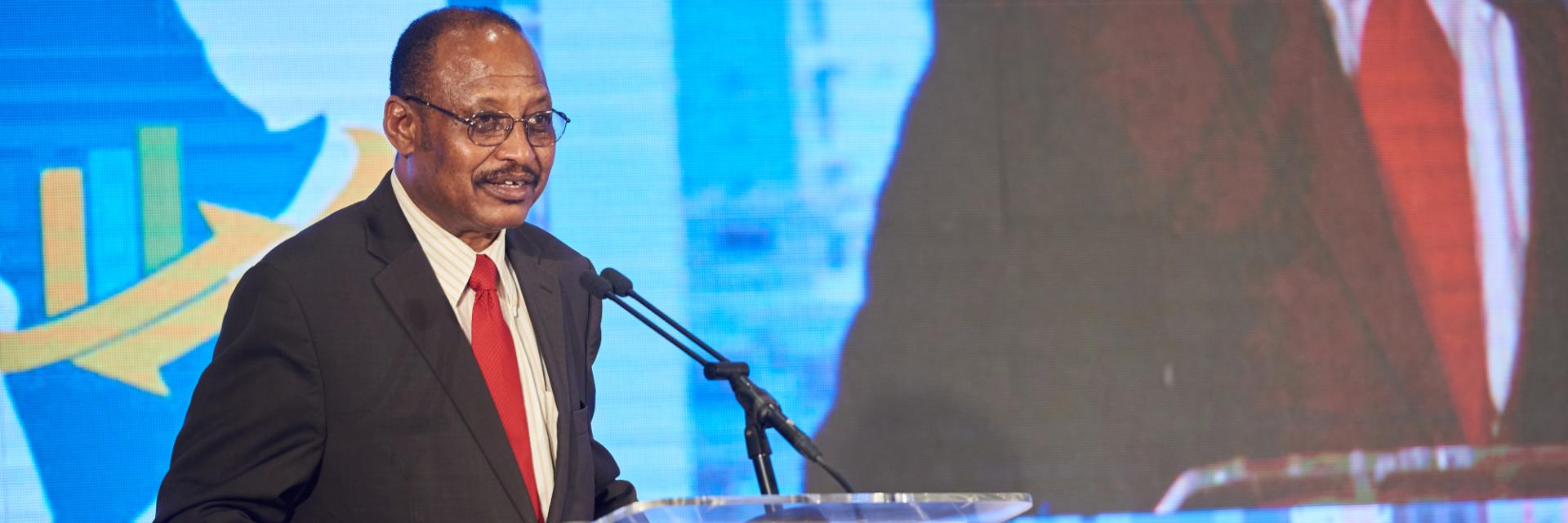Niamey, 2 March 2023 (ECA) - During the 9th session of the Africa Regional Forum on Sustainable Development (AFRSD-9) in Niamey, Niger, the ECA media team had the opportunity to interview Adam Elhiraika, ECA’s Director of Macroeconomic Policy Division. The purpose of the interview was to gain more insight into Africa's progress with regards to the implementation of the SDGs.
-
Can you give us a little background on ARFSD-9?
Each year ECA in collaboration with the African Union Commission, the African Development Bank and other entities in the United Nations system, African governments, private sector review progress made in the implementation of selected Sustainable Development Goals and present the findings to this Forum for discussion, deliberation and way forward ahead of the high-level political forum on sustainable development. This year the focus is on five SDGs: Goals 6 (clean water and sanitation); 7 (affordable and clean energy); 9 (industry, innovation, and infrastructure); 11 (sustainable cities and communities); and 17 (partnerships for the Goals) and the corresponding goals of Africa transformation Agenda 2063.
-
What’s your assessment of Africa’s progress on the SDGs?
Africa is making a very slow progress on the SDGs compared to the other regions in most of the indicators and in some areas there is even a regression. There is a huge variation in countries on the SDG progress, a trend that is worrying given the remaining time we have to achieve the SDGs. However North African countries are doing well and are above average in their performance in terms of clean water and sanitation and energy while majority of those in the Sub Sahara Africa, access to clean water and sanitation, energy is still below the average. For example only 30% of Sub Sahara Africa had access clean/safe drinking water sources compared to the world average of 74%.
-
Why is progress slow?
Issues of finances, poor planning, lack of commitment on implementing the SDGs by most governments in Africa has led to regression on SDGs in many countries. This is alarming. A lot of coups, many contested elections, insecurity, which is affecting development is affecting the implementation process.
Also the effects of COVID-19 pandemic, war in Ukraine, drought has made countries divert their resources to health, food security, social issues, economic stimulus and lose focus of implementing the SDGs
-
Which SDG indicators are countries significantly falling behind on, and which indicators are showing progress?
We have the indicator on share of manufacturing in Africa which remains the same at 10% to the global average of over 40%. This is a huge difference.
There is progress on domestic resource mobilization where we have some improvement. Africa is increasingly reliant on its domestic resources. For example in 2013 domestic resource mobilization was at 61% and now it is at 65.8%.
-
What should countries do to ensure that they are back on the right track of implementing the SDGs?
Governments have to go back to the drawing board, examine their strategies, priorities and plan to achieve the SDGs. Serious auditing and decision making is required. Many countries are overwhelmed by the crisis facing their countries and are forgetting about the SDGs. As much as they need to do their best to address the current crisis they have to also remain focused on implementing the SDG Agendas for long-term and permanent solutions to their problems. Economic development, social security, peace all depends on the government’s ability and planning. Access to modern and renewable sources of energy is fundamental to achieve sustainable human development.
-
How is ECA helping countries address the challenges in SDG implementation?
ECA and its partners is helping countries in building capacity, resource mobilization, data collection to ensure the smooth implementation of the SDG Agendas.
-
There has been a lot of emphasis on the SDG 17 at this Forum. Why?
The SDG 17 is very important because it deals with issues of finance. Many low-income countries are struggling with resource mobilization. The only way to mitigate the aftershocks of the covid 19 pandemic, climate change is through financing
African governments need to strengthen domestic resource mobilization, including through private financing and sustainable public borrowing. Also more efforts are needed in strategic development cooperation, particularly enhanced South-South cooperation and issuance of impact bonds.
-
What is your key message to the 2023 high-level political forum on sustainable development, to be held in New York in July; and Sustainable Developments Goals Summit at Heads of State and Government high level week in September 2023.
Focus on enhancing support on Africa to address their challenges to progress towards the SDGs. To the African countries let us stay on course on the progress of SDGs.

